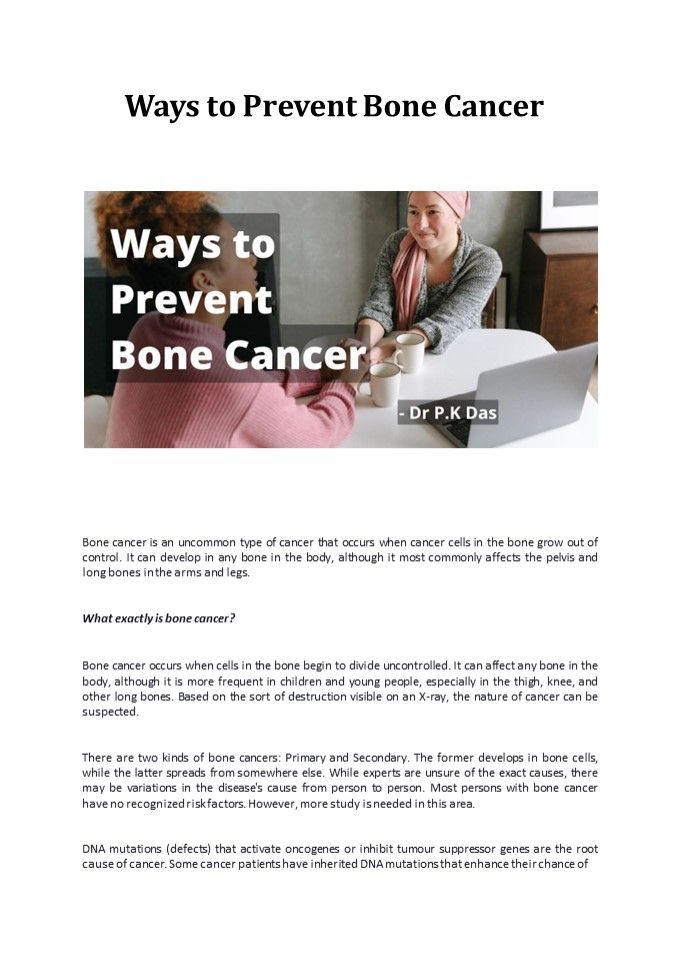Risk factors for bone cancer
Title:
Risk factors for bone cancer
Description:
Paget’s disease of the bone is more common in elderly persons and can raise the chance of bone cancer later in life. visit our website to get treatment from best oncologist in Delhi ncr : – PowerPoint PPT presentation
Number of Views:0
Title: Risk factors for bone cancer
1
Ways to Prevent Bone Cancer
Bone cancer is an uncommon type of cancer that
occurs when cancer cells in the bone grow out of
control. It can develop in any bone in the body,
although it most commonly affects the pelvis and
long bones in the arms and legs. What exactly
is bone cancer? Bone cancer occurs when cells
in the bone begin to divide uncontrolled. It can
affect any bone in the body, although it is more
frequent in children and young people, especially
in the thigh, knee, and other long bones. Based
on the sort of destruction visible on an X-ray,
the nature of cancer can be suspected. There
are two kinds of bone cancers Primary and
Secondary. The former develops in bone cells,
while the latter spreads from somewhere else.
While experts are unsure of the exact causes,
there may be variations in the disease's cause
from person to person. Most persons with bone
cancer have no recognized risk factors. However,
more study is needed in this area. DNA
mutations (defects) that activate oncogenes or
inhibit tumour suppressor genes are the root
cause of cancer. Some cancer patients have
inherited DNA mutations that enhance their chance
of
2
developing specific cancers. Genetic testing is a
method of determining whether or not a person
carries one of these mutations. On the other
hand, most DNA mutations generate some inherited
forms of bone cancer. Some kinds of bone cancer
afflict youngsters largely, whereas others mostly
affect adults. The most usual treatment is
surgical removal, but chemotherapy and radiation
treatments are also options. The type of bone
cancer being treated determines whether
surgery, chemotherapy, or radiation therapy
should be used. Risk factors for bone
cancer Although the cause of bone cancer is
unknown, scientists have discovered that some
factors are related to an increased risk, like
- Genetic disorders Li-Fraumeni syndrome and
hereditary retinoblastoma are two rare
genetic diseases that enhance the risk of bone
cancer in families. - Paget's disease of bone Paget's disease of the
bone is more common in elderly persons and can
raise the chance of bone cancer later in life. - Cancer radiation therapy Large doses of
radiation, such as those used in cancer radiation
therapy, increase the chance of developing bone
cancer. - Tips to prevent bone cancer
- Here are a few ways in which you can reduce the
risk of bone cancer - The causes of the majority of bone cancers remain
unknown. Some bone cancer occurrences have been
connected to hereditary factors, while others
have been linked to prior radiation treatment.
There are no specific ways to avoid bone
cancer that has been discovered yet. The
following suggestions, on the other hand, will
help you keep your bones healthy and cancer-free
- Maintain a balanced diet
- A healthy, balanced, and nutritious diet is
important for maintaining a healthy body weight.
This may aid in the prevention of some cancers
and the reduction of unneeded consequences.
Maintain a healthy weight by eating fruits,
veggies, and whole grains. Avoid processed
meats and packaged foods in addition to eating
a balanced diet. These habits may help to lower
the risk of some cancers.
- Avoid smoking
3
According to new research, those who smoke
cigarettes have an increased chance of
acquiring blood, immune system, and bone marrow
cancers. A healthy lifestyle is one of the most
important factors preventing many malignancies.
Smoking is an absolute no-no to living a happy,
healthy, and cancer-free life.
- Drink alcohol in moderation
- Alcohol consumption can increase the risk of bone
cancer. On the other hand, moderate drinking can
help to minimise the risk. Long-term
alcohol consumption or heavy drinking should
be monitored regularly because it can increase
your risk of cancer. You can chat to your cancer
doctor in Delhi NCR about the amount of alcohol
you can consume daily.
- Exercise regularly
- Physical activity daily helps improve bone health
and keep the body in good shape. Exercise can
help you avoid and treat many chronic conditions
if you do it daily. It aids in the improvement of
blood circulation and the prevention of
numerous ailments. Certain workouts and yoga
asanas are beneficial to bone health.
- Get regular check-ups done
- Early cancer detection is important for its
successful prevention and therapy before it
spreads. It's also crucial to consult your
cancer doctor in Delhi NCR for screening
and diagnosis before the disease progresses to
a more serious stage. If a person is diagnosed
with osteoporosis, a thorough examination for any
secondary causes of the disease is required. It's
also important to be mindful of your bone
structure. It's also important to be aware of
your bone health so that you can prevent bone
disease and avoid serious difficulties in the
future. - The Final Word
- Bone cancer can be avoided by following the
advice given above. However, if the reason is
inherited, you should consult your doctor about
future treatment options. One of the most
effective strategies to treat bone cancer is to
diagnose it early. It is a rare form of cancer
therefore, see your doctor regularly. In fact, in
otherwise healthy persons, bone cancer is
significantly easier to treat. - If you require a bone cancer doctor in Noida, you
can contact Dr. P.K. Das, a cancer specialist. He
is a renowned medical oncologist and
haematologist who works at one of the country's
most modern and comprehensive cancer centres. His
patients have access to a wide range of services,
such as screenings, diagnostics, and other
procedures.































